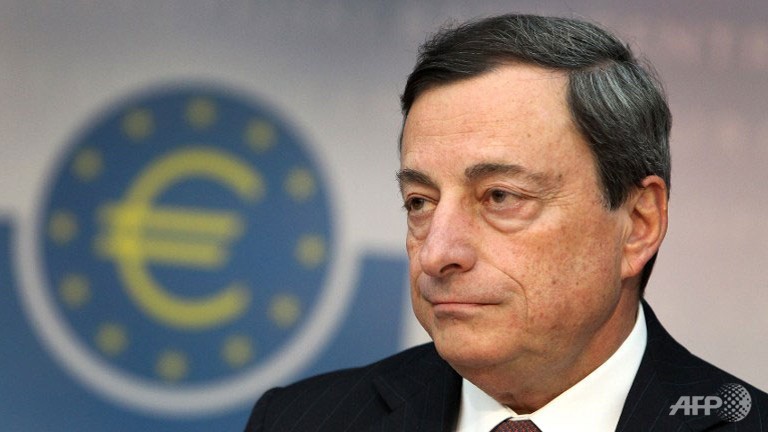ECB chief slams Cyprus bailout

Mario Draghi, President of the European Central Bank, believes the European Central Bank cannot step into the breach left by a lack of action by eurozone governments to solve the region's debt crisis. (AFP PHOTO/DANIEL ROLAND)
NICOSIA: The European Central Bank chief hit out on Thursday at what he said was a poorly managed bailout for eurozone Cyprus as protests at the crippling costs for the small Mediterranean island raged on.
Mario Draghi described as "not smart" an initial plan to impose losses on all depositors in the island's banks -- large or small -- which rode roughshod over previous guarantees within the European bloc on balances up to 100,000 euros.
He said the collapse of the island's bloated offshore financial sector showed the importance of banking union among eurozone countries to avert a similar meltdown hitting one of the currency's larger economies.
"There is no better way to prevent these crises than by shedding light on national banking systems via the sort of international oversight that would be in place" with a single supervisory mechanism, Draghi said.
"Any delay on this front is extremely disappointing."
He said a new euro-zone authority to resolve failed banks should start its operations in 2015, rather than the existing proposal of 2018.
The ECB chief rejected criticism that the bank had strayed too far into politics by delivering an ultimatum to the Cypriot parliament that it would pull the plug on both of the island's biggest lenders if they did not agree to wind up one and massively reduce the size of the other.
He said that if the bank had not acted both lenders would have collapsed, with even more draconian results for the Cypriot economy.
But as more details emerged of the scale of the job losses for Cyprus' banking sector and the austerity budgets that loom ahead, bank workers downed tools in protest at what they fear will be the loss of hard-earned pensions.
The brief strike, followed by a protest march on parliament by around 1,000 smartly dressed bankers, comes despite reassurances by President Nicos Anastasiades that every effort would be made to preserve pension funds at the two banks in the eye of the financial storm.
Bank employees' union ETYK called the two-hour stoppage over concerns that pension funds at failed Laiki and at the Bank of Cyprus are not being protected under the 10-billion-euro bailout deal with the IMF, European Commission and European Central Bank.
Protesters marched through the heart of the capital Nicosia carrying banners reading: "Wake up Cyprus", "Hands off our jobs, hands off our provident funds" and: "We are paying for mistakes of bankers." Fearful Laiki employee Anna Papaioannou said: "What happened to Cyprus is rape. It's rape, it's robbery and murder all together."
It was the first significant industrial action in Cyprus, despite the crippling costs of the eurozone bailout which will slash the island's banking sector -- hitherto its main source of employment growth -- and require years of tax increases and spending cuts.
According to details of the bailout deal that emerged on Thursday, Cyprus must still adopt 351 million euros in austerity measures in its 2013 budget before receiving the EU financial aid expected in May.
"Over 2013, the authorities will rigorously implement the 2013 budget law with additional permanent measures of at least 351 million euros (2.1 percent of GDP)," says the memorandum of understanding, seen by AFP.
Among steps Cyprus must still take are raising corporate income tax from 10 percent to 12.5 percent, hiking taxes on interest income to 30 percent and raising property taxes.
On the spending side, it will have to end its practice of grants for acquiring first residences and making construction loans, cap the number of pensioners receiving Easter bonuses and reduce state and broader public sector pensions by between 0.8 percent and two percent.
The new finance minister, Haris Georgiades, vowed on Wednesday to implement the bailout terms in full, saying the government would do "whatever it takes to fix our public finances and put our economy back on track for growth.
Cyprus is already in recession, with unemployment of around 15 percent expected to grow sharply this year and next. Forecasts before the deal was agreed saw GDP contracting by 3.5 percent this year.
What the stars mean:
★ Poor ★ ★ Promising ★★★ Good ★★★★ Very good ★★★★★ Exceptional
Related Contents
Latest News
More News
- Banking sector targets double-digit growth (February 23, 2026 | 09:00)
- Private capital funds as cornerstone of IFC plans (February 20, 2026 | 14:38)
- Priorities for building credibility and momentum within Vietnamese IFCs (February 20, 2026 | 14:29)
- How Hong Kong can bridge critical financial centre gaps (February 20, 2026 | 14:22)
- All global experiences useful for Vietnam’s international financial hub (February 20, 2026 | 14:16)
- Raised ties reaffirm strategic trust (February 20, 2026 | 14:06)
- Sustained growth can translate into income gains (February 19, 2026 | 18:55)
- The vision to maintain a stable monetary policy (February 19, 2026 | 08:50)
- Banking sector faces data governance hurdles in AI transition (February 19, 2026 | 08:00)
- AI leading to shift in banking roles (February 18, 2026 | 19:54)

 Tag:
Tag:




















 Mobile Version
Mobile Version